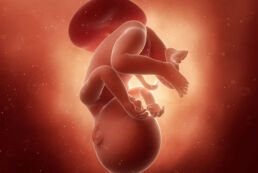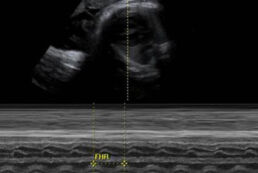Baby's Height and Weight
At 38 weeks of pregnancy, the baby is about 49-50 centimeters tall, about the size of a rhubarb. The baby weighs about 3000 grams.
Development of the Baby

Baby Movements at 38 Weeks Pregnancy
Your baby may move less because his/her space is narrowed. But you can still feel the thrust of his tiny hands and feet as he stretches inside.
You’ll feel your hiccups in the form of rhythmic little jumps.
It is good to follow their movements as they will move in moments other than sleep. If you do not feel their movements for a while, be sure to talk to your doctor.
Ultrasound Image

In 38-week pregnancy ultrasound images, your doctor will look at your baby’s position, heart rate, movements, and the amount of amniotic fluid. The amount of amniotic fluid may decrease slightly this week.
Ultrasound data may not give accurate results regarding weight and height. Like ours, weight and height values are given according to a certain average in weekly pregnancy development articles. For this reason, your baby’s weight and height may not be as much as the figures mentioned in these articles. You should first ask your doctor about any issues you are worried about.
Changes in the Mother's Body
If you have never felt it before, you may feel false contractions (Braxton Hicks contractions) at 38 weeks of pregnancy.
False contractions are a kind of birth rehearsal of the body. Thus, the uterus starts to work the muscles that will push the baby at birth. Starting from above, it slowly descends. These contractions are usually irregular, sometimes they can be regular. If the contractions bother you, either rest or walk around not to focus on the contractions, drink some water, or do something different. In recent weeks, these contractions may be more intense and worry the expectant mother. If the contractions become frequent and regular, tell your doctor without delay.
How Does Childbirth Begin?
It is not yet known exactly what started the contractions at birth. The most important thing that is known is that contractions in the uterus facilitate the exit of the baby. This system works just like the pooping muscles in our intestines. As you know, our bowel muscles contract spontaneously and the stool almost excretes spontaneously. This is the working principle of the muscles in the uterus at birth. This is the reason why at the time of approaching the exit of the baby during birth, the expectant mother has feelings of pooping and pushing. Of course, the baby is also active during birth, and he/she struggles to be born by pressing on the pelvis with his/her head. Thanks to this struggle of the baby and the working principle of the uterine muscles, births can easily take place. It is enough to believe and trust the mother and baby’s equipment about birth. Thanks to this magnificent equipment and “sufficiently supported” at birth, expectant mothers can perform births without vaginal tears. Vaginal tears are inevitable in the mother in cases where the expectant mother is pushed unnecessarily or the baby is pushed from above. Here, in natural births, a support is given that will allow the mother’s uterine contractions to push the baby easily (just like in the example of the working principle of the intestines). Thus, babies are almost born themselves. This support should include:
– The environment is calm and not crowded,
– The room temperature is ideal, the lights are dim,
– One-to-one midwife support (the presence of a midwife who can be trusted by the expectant mother during childbirth and says “you can do it”),
– Application of non-drug pain relief methods to the mother (massage, suggestion words, breathing control),
– Implementation of techniques that provide relaxation during labor and facilitate labor (warm bath, sitting on the stability ball and water birth),
– The father candidate, who has received childbirth preparation training, supporting his/her spouse during childbirth.
Every mother and her baby has the right to be adequately supported at birth. If expectant mothers and fathers know and demand these rights, births will take place with healthy and positive memories for both parents and babies.
Points need to be considered
Try to restrain yourself when your nesting instinct comes. Don’t waste your energy, because you’ll need it at birth and afterwards. (For detailed information about the nesting instinct, You can check out our article of 36th week.) If the course of your pregnancy is healthy, you can continue your yoga and exercises.
One of the signs of birth is the softening of the mucus plug (a bloody structure) in the cervix and therefore some blood. Among the public, this is called Engagement Arrival. Since you cannot understand the difference between real bleeding and engagement, you should definitely inform your doctor without losing time in such a case. Especially if the bleeding is accompanied by pain…
Canbebe on Social Media!
Join our community of mothers and fathers on social media. Be close to caring community, sharing advices between each other on our everyday life with our baby.
